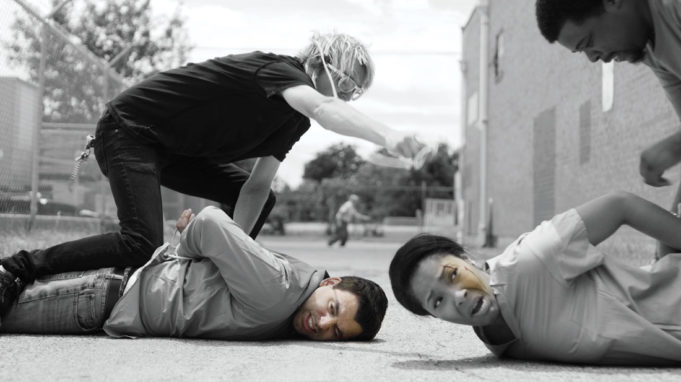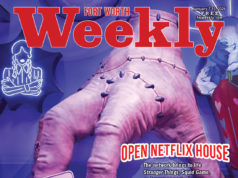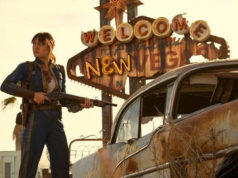Various conflicts this past weekend kept me from seeing very much of the Fort Worth Indie Film Showcase, but fortunately, I was able to send two eminently capable Weekly writers in my place. I did, however, manage to see the Fort Worth-filmed Monochrome: The Chromism, a dystopian science-fiction film in which the world is black-and-white but people start taking on skin color and are quarantined by the government. Kodi Zene’s movie conjured up unhappy memories of the 1998 film Pleasantville and works as neither racial allegory nor killer-virus thriller, but it’s uncanny how much more convincing dystopia looks when it’s shot in black-and-white. Zene does prove that such a film can be made here. Now, I turn things over. — K.L.
Of the more anticipated films, Taking Tiger Mountain Revisited is a dystopian overthrow-the-patriarchy-type story, a concept that modern-day moviegoers might not find too radical but that was way ahead of its time when the original film debuted in 1983. “This is the first time we have shown the film in our hometown,” said co-director Tom Huckabee. “We thought it was too radical for Fort Worth at the time of production.”
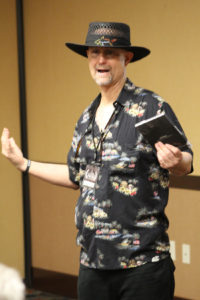
The story takes place during World War III and is easy to follow on a timeline. However, it’s packed full of brainwashing, radical feminist terrorists calling for the eradication of males, forced sexual orientation reprogramming and genital mutilation, and an attempted assassination of the head of a Welsh human trafficking ring. There may have been some tigers in there, too, but that minor detail gets lost among the mess of everything else. The film opens to a fully nude U.S. draft dodger, Billy Hampton, Bill Paxton in his first-ever film role, who is forcibly castrated and reprogrammed to be a sleeper assassin. During the reprogramming, his sexuality is also altered, because why not? Take that, patriarchy!
The film was a bit of a sensory overload. Hampton also faces the kill-or-not-kill dilemma. While all this is going on, the audio is overlaid with – what I’m guessing are – hypnosis tapes. “A bootleg VHS copy found its way onto the internet 15 to 20 years ago,” Huckabee said. “People loved it because the outdated format was so bad and was never made for widescreen. There were scenes where people on opposite ends of the room were talking, and all you could see was a wall.”
It’s unclear how Taking Tiger Mountain Revisited holds up to “woke” 2019 standards and why Billy has only one change of clothes throughout the lengthy timeline of the movie. However, the film is thought-provoking and fantastically made. The chorus of the song over the end credits is “Kill all men, kill all boys,” which is weirdly catchy.
Michael Baker’s Who Is Martin Danzig? opens with an older man sitting on a park bench. From his burned-out look and the conversation he’s having with another more put together character, it’s implied he’s facing forced retirement. The 12-minute film shows us his younger replacement (Alana Gay) picking flowers and giving them to passersby at the park. The people turn out to be something akin to guardian angels who dole out random acts of kindness and give the world hope. The film has that Morgan Freeman-playing-God-type feel, just with a lot more realism.
Friday afternoon’s shows kicked off with Stephen Riscica and Delia Kelly’s Tumble Dry, a 30-minute comedy about following the advice of a therapist while also navigating online dating. Gary (Jacob A. Ware) is a compulsive single guy who is in the process of launching the one-act play he wrote, which is set in his therapist’s waiting room. While chasing his dream, Gary also tries his hand at almost every online dating app except for Farmers Only. He meets three women: an overly clingy “I think I love you on the first date” type, a self-absorbed social media influencer only interested in a free meal and maybe a part in his play, and the “take over your life, meet the family, and rush into marriage” woman. This dry and sarcastic comedy had the entire screening room laughing for more than half the short.
The laughs ramped up as more people, presumably fighting traffic, poured into Theater C by the third film, Cupid’s First Day. Sami Saad’s short depicts a world where characters like Santa and the Easter Bunny not only exist but are basically contract labor. Among the characters is Clarence (William R. Farley), your quintessentially lovable, husky screw-up a la Homer Simpson who can’t hold down a job with any department of magical characters. As a last-ditch effort, the manager gives him the most straightforward job on the list, Cupid. He promptly wears the wings and the diaper. The boss says they haven’t done that since the ’70s.
Clarence is softballed a perfect-for-each-other couple as a first assignment. He still manages to screw it up, to the point where the woman he is trying to help mistakes him for a mugger and beats the stuffing out of him. In the end, the couple gets together despite or possibly because of Clarence’s shenanigans, and he is then given harder assignments, which starts his new adventures post-film.
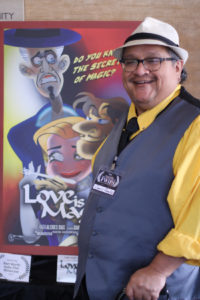
Wrapping up the 5 p.m. bloc was computer-animated Love Is Magic, written, directed, and animated by Fort Worth’s Daniel M. Rosales. Only four minutes long, it tugs on your heartstrings with its story about an old-school magician’s wife and lovely assistant eating dinner in a small, dumpy apartment with an illusionist who clearly is seducing the wife. He’s not her husband. The lovers hear the husband coming home, and the illusionist vanishes because magic. The angry husband chases his wife through their apartment. As the chase goes on, they cycle through their stage acts until finally she jumps into a top hat and leaves a note that reads, “It’s not you, it’s not me, it’s the rabbit.”
The festival showcased a lot of great talent and some meh stuff. The event was a good way to kill an evening or two, enjoying all of the emotions films can offer: laughing, crying, and in some cases scratching your head. — R.L.
The lobby of the Hilton Garden Inn was buzzing on Saturday after the screening of Judy Meredith’s documentary. Who Is James Meredith? focuses on her husband, the civil rights figure who was the first black student admitted to the University of Mississippi in 1962. He went on to head a one-man march (the Meredith March Against Fear) from Memphis to Jackson, Mississippi. Meredith survived an ambush and ensuing gunfire during his 1966 march.
James Meredith came to Fort Worth for the showing, much to festival program director Hill Hass’ excitement. “I enjoyed it,” Hass said of the film. “It’s very educational,” adding that Meredith’s story is inspiring and helped shape his definition of heroism. “To me … what makes a hero sometimes is the location and the opportunity,” he said.
Who Is James Meredith? was one of four films nominated for Best Foreign Short/MicroShort (Documentary), foreign in this case meaning non-Texan. By 1:15, the energy was still high as Theater C filled to capacity for the screening of Evergreen. Joe Duca’s drama tells the story of a Catholic man named Paul and his not-at-all-religious girlfriend Gena. Focusing on the couple’s struggle to overcome relationship problems (Paul wants to abstain until marriage), the pair decide to spend their Christmas break figuring out whether they stand a chance together.
One curious thing about Evergreen is that, despite the characters commenting several times about the beauty of the scenery, we never get to see it. Why shoot in the dead of winter in the mountains of Colorado if the audience can’t peek at the view? There are brief moments of single-frame shots of Paul and Gena playing in the fields but nothing to show the significance of their location. This seems problematic, given that the scenery is the whole point of the couple’s trip to the cabin and subsequently the catalyst for their ensuing drama.
In addition, the writing had moments of “people don’t really talk like that” awkwardness. Though I can’t claim to know how all couples discuss their sex lives, I doubt many guys talk about how they’re sorry they can’t “give themselves” to their partner, even the most devout ones. But, hey, maybe this is just part of the lexicon among the hand-rolled cigarette-smoking hipster crowd these days.
Evergreen is now the first film to sell out at the Fort Worth Indie Film Showcase and was nominated for Best Overall Foreign Feature and Best Foreign Feature/Featurette (Drama).
Hass said the strong turnout this year has left him both humbled and excited. He said staff had to add chairs to Theater C before Evergreen to accommodate all the filmgoers. “It’s a good problem to have!” he said, smiling. — E.R.



